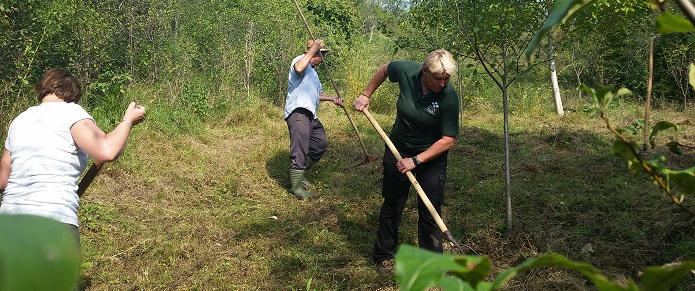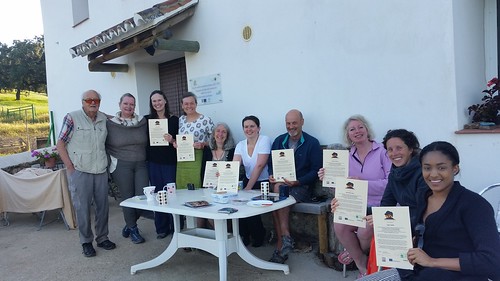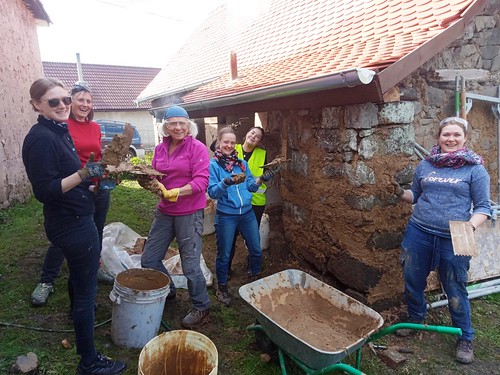
Preserving Scotland’s nature and culture is a vital priority for many wildlife organisations across the country.
This was also the main focus for The Firm of ARCH’s series of Erasmus+ projects, collectively titled The Nature Exchange Two (NET) programme.
Working with a consortium of UK partners, they coordinated international specialist courses for participants who work in wildlife organisations that prioritise natural and cultural heritage.
This in turn provided participants with new ideas to implement within their own organisation.
“In Scotland, the environment and its natural heritage is important as it’s one of our biggest employers,” said project manager Libby Urquhart.
“It generates enormous income; therefore, it’s important for us to learn from other countries how we can maintain the environment and enhance our practices. There’s also a big drive for biodiversity, such as sustainable food and forest maintenance.”
The Firm of ARCH quickly identified that targeted courses, designed by international partners with a mix of natural and cultural elements, were the best method for staff to discover new practices and knowledge.
Understanding priorities
During preparation, the Firm of ARCH worked closely with their international partners and UK consortium, made up of Scottish natural and cultural heritage-based organisations such as John Muir Trust, Institute of Chartered Foresters and The National Trust for Scotland.

Their partners and consortium were carefully selected, ensuring a good representation of natural and cultural heritage sectors. “We believe that it’s impossible to separate nature from culture and that there is a benefit in these sectors working and learning together.
“We have one main meeting with the consortium at the beginning of the year, where we can identify their priorities and start to build courses around them,” said Libby. “We also contact our partners and ask them, with the priorities in mind, what courses they can put together for us to offer the consortium and their participants.
“These courses are constantly tweaked to meet the needs of our consortium and before participants go out they send a biography which identifies their exact aims for that particular course.”
For example, Firm of ARCH’s Polish partner, Society for The Coast, planned to coordinate a coastal erosion programme. While they usually focus on wetland management, they changed their course to recognise coastal issues, as 2020 was Scotland’s Year of Coasts and Waters – it was a new priority for the consortium.
There is a risk in Scotland and the UK as island nations to look inward for solutions - the NET programme has allowed staff to gain fresh perspectives on best practices and challenges from other countries.
Through the years of running these projects, the organisation identified clear criteria when selecting international and UK partners. Their consortium, for example, is made up of government bodies, universities, right down to small and medium-sized enterprises (SMEs).
“We’ve worked with a few partners for 10-15 years, so we know them very well. We particularly wanted partners we could communicate with well,” Libby added. “But we also wanted to demonstrate the differences in the management of natural and cultural heritage from all sorts of different regions in Europe.”
Discovering new perspectives
Over the years, the NET programme has seen a great variety of specialist courses, from forest management and coastal erosion to mountain scrub reintroduction – reflective of the planning process behind the project.
For the participants and their organisations, the aim was to develop skills relevant to their field of work and exchange best practices.
Isobel Filor, from the John Muir Trust, took part in a forest management course in Slovenia and found the experience had a crucial impact on her work.

“I was impressed by their culture of respect for wild places, which I felt far more strongly than I have done in Scotland,” she said. “It would be brilliant to see this level of inclusion of nature and respect for our natural resources and it is something that I hope to share with others.”
Since the course, she has shared her learning at a Europarc conference and created a short piece about her findings and ideas based on a visit to Krokar Virgin Forest. These courses are available for participants working at all levels within organisations, whether they are a seasonal ranger, volunteer or policy maker, which then ensures their learning is disseminated as widely as possible.
“We discuss dissemination with participants before they go and ask how they will share their learning,” said Libby. “We’ve had some good outputs, such as short films, and we encourage participants to work together to report and create something; preferably while they are away.”
One example of this kind of creative output is a video report, created by participants, which details a forestry regeneration course in Norway:
Through these placements and the resulting outputs, many in the consortium have found new practices and knowledge to help preserve Scottish wildlife and culture.
Mike Daniels, Head of Land Management at John Muir Trust, said: “The programme has given our staff an invaluable opportunity to learn from and share experience of practical land management and nature conservation in other countries.
“We are a relatively small charity with limited training budget and few, if any, opportunities for overseas travel.
“It’s enabled us to deliver CPD experiences for staff and broadened their horizons, and indeed that of the organisation. There is a risk in Scotland and the UK as island nations to look inward for solutions - the NET programme has allowed staff to gain fresh perspectives on best practices and challenges from other countries.”
Read more Erasmus+ adult education stories by visiting our theme-specific webpage!
